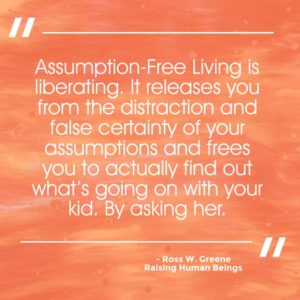I have found that, speaking in large generalities, adults rarely understand why kids are doing what they’re doing.
This is due to a combination of things.
Part of it is because kids operate according to kid logic, and sometimes kid logic can be absolutely bonkers.
Part of it is because adults are really likely to take things personally, or self-centeredly focus their interpretation of their kid’s behavior on themselves instead of on the kid.
Part of it is because adults have often forgotten what it felt like to be a kid and actually think like a kid…but adults are still operating out of their own internal small-child-self, who was modeled how to react to things by however *their* adults reacted.
Learning how to have a conversation with a child about what they’re thinking and what they’re concerned about can make absolute miles of difference in being able to solve problems with a child.
And yeah, I know, that if you sit down and ask your kid “Why did you do xyz” then you’ll often get “I dunno” from them — that’s not what I’m talking about. Collaborative problem solving is a whole strategy! Dr. Ross Greene lays out wonderful ideas in his books (Raising Human Beings, The Explosive Child, etc) that can help with what to do if your child responds “I don’t know”, or gets too stressed out by having a conversation with you about what’s going on for them.
But an early step is to stop assuming that you know exactly why they’re doing what they’re doing. Or at least to notice yourself assuming it. That gives you space to get curious instead of jumping to a conclusion that may or may not be accurate.



